|
|
|
Sort Order |
|
|
|
Items / Page
|
|
|
|
|
|
|
| Srl | Item |
| 1 |
ID:
132358
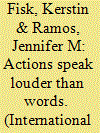

|
|
|
|
|
| Publication |
2014.
|
| Summary/Abstract |
How and to what extent is the preventive use of force becoming the future of foreign policy for states around the world? We explore the spread of preventive logic to increasing numbers of states and examine the degree to which an international norm toward preventive self-defense is cascading in the international system. Through content and comparative case study analysis, we investigate leaders' rhetoric and security policies concerning what we theorize is the key indicator of a country's emulation of the United States: assertion of the right to the unilateral, preventive use of force outside of its borders. Our evidence indicates that there has been a shift away from the established international norm-which considers the use of preventive force illegal and illegitimate-toward growing acceptance of unilateral preventive strategies, a shift largely propelled by the precedents set by the United States in the war in Iraq and its use of unmanned aerial vehicles (UAVs or drones) in the global war on terror. Our findings also reveal that some states are applying the strategy of preventive self-defense beyond the use of UAVs for targeted killings to the extreme contingency plan for nuclear war. We conclude by discussing possibilities for further research and considering the implications of this phenomenon.
|
|
|
|
|
|
|
|
|
|
|
|
|
|
|
|
| 2 |
ID:
133845
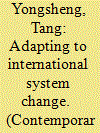

|
|
|
|
|
| Publication |
2014.
|
| Summary/Abstract |
Understanding the transition happening in the international system requires a balance between old logic and new reality. As the power pattern changes and the characteristics of international order unfold, the complications of global politics, casual relationships among different issues, and the echoing effects of strategic choices will lead to greater need for global governance. The logic of simple power politics will not be enough when strategists confront nontraditional challenges.
|
|
|
|
|
|
|
|
|
|
|
|
|
|
|
|
| 3 |
ID:
106670
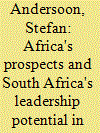

|
|
|
|
|
| Publication |
2011.
|
| Summary/Abstract |
This article examines Africa's role in an evolving international system where powerful emerging markets, such as bric, together with established powers are shaping economic trajectories. The specific focus is on South Africa as an aspiring leader on the African continent, and on its potential for becoming an emerging market shaping the global order together with bric and the West. It is unclear whether a changing global economy in which the postcolonial world plays a greater role will result in improved developmental prospects for Africans as African countries gradually reorient themselves from the West to the South, or whether relations with emerging markets will resemble neo-colonial ties with the West. South Africa's structural weakness, stemming from serious domestic problems of a social, political and economic nature, threatens to undermine its standing in Africa and its emerging market status.
|
|
|
|
|
|
|
|
|
|
|
|
|
|
|
|
| 4 |
ID:
132085
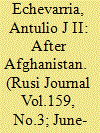

|
|
|
|
|
| Publication |
2014.
|
| Summary/Abstract |
One of the key issues to be discussed at the forthcoming NATO summit will be preparation for future military engagements after more than a decade of counter-insurgency operations in Afghanistan. Antulio J Echevarria II revisits some of the key lessons to be drawn from this experience, and highlights the questions that will need to be addressed if the Alliance is to be equipped to meet future challenges in a changing world.
|
|
|
|
|
|
|
|
|
|
|
|
|
|
|
|
| 5 |
ID:
132034
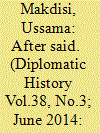

|
|
|
|
|
| Publication |
2014.
|
| Summary/Abstract |
The question of how to represent the U.S. role in the Middle East brings to the fore the question that Edward Said first raised in 1978 in Orientalism about the nature of American understandings of the Middle East. More than three decades after the publication of his book, Said's criticism of Orientalist scholarship-and his accompanying plea for a secular humanistic interpretation to replace it-remain both topical and enigmatic. It is one thing to criticize American representations of foreign cultures; it is an entirely different matter to study American engagements with them. These are by no means unrelated endeavors, but by the same token, they entail very different conceptions of what constitutes a field of inquiry and how to go about studying it comprehensively. The recent emergence of a more critical scholarship of America and the Middle East, therefore, begs the question of whether it is possible to write a history that takes both the Americans and Arabs equally seriously despite the prevailing political climate, and ultimately what kind of methodology this might entail for the rewriting of U.S.-Arab relations, and more broadly, American involvement in the world.
|
|
|
|
|
|
|
|
|
|
|
|
|
|
|
|
| 6 |
ID:
188347
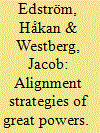

|
|
|
|
|
| Summary/Abstract |
The article aims to contribute to previous research in two main ways. First, we intervene in the debate on the stability of the present unipolar system by offering an analytical framework and an empirical approach for exploring and categorizing the actual strategies pursued by the major powers in the contemporary international system. In doing so, we present an analysis of how the strategies of the five system-determining states interact and affect the stability of the system. Second, in order to be able to explain why states pursue different strategies, we complement the analytical framework of structural realism with insights from research on Power Transition Theory (PTT). Hereby, we offer a new comprehensive theoretical approach for analyzing how asymmetric power relations affect strategic choices of major powers.
|
|
|
|
|
|
|
|
|
|
|
|
|
|
|
|
| 7 |
ID:
137365
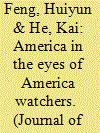

|
|
|
|
|
| Summary/Abstract |
Based on an original survey conducted in the summer of 2012 in Beijing, we examine how China's America watchers—IR scholars who work on US-China relations—have viewed China's power status in the international system, US-China relations and some specific US policies in Asia. Our survey shows that almost half of the survey participants thought that America would remain the global hegemon in the next ten years. Meanwhile, a large majority was also optimistic that China is a rising great power, especially in the economic sense, in the world. More than half of the respondents saw Asian military issues, such as the South China Sea issue, as the most difficult problem between China and the US.
|
|
|
|
|
|
|
|
|
|
|
|
|
|
|
|
| 8 |
ID:
143272
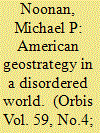

|
|
|
|
|
| Summary/Abstract |
A quarter century after the end of the Cold War the United States faces an international geopolitical landscape that many would have not imagined a generation ago. Today the U.S. faces a disordered world where revisionist powers such as China and Russia wish to change the dynamics of the international system and a revolutionary Islamic State has aspirations to overthrow the entirety of the system itself. While the U.S. still maintains the strongest conventional military capabilities in the system it also has many global commitments and its resources are constrained. In order to cope with the current disordered world it must learn to operate within the current era's ambiguities, particularly in the space between war and peace, and much more adroitly blend its capabilities across the elements of national power to directly and indirectly confront threats and challengers.
|
|
|
|
|
|
|
|
|
|
|
|
|
|
|
|
| 9 |
ID:
090691
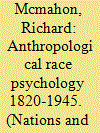

|
|
|
|
|
| Publication |
2009.
|
| Summary/Abstract |
This article examines ethnic stereotypes in biological race classification of Europeans between the 1830s and 1940s as part of political discourse on national identity. Anthropologists linked physical-psychological types to nations and national character stereotypes through 'national races', achieving an often quite enduring international consensus on each race's mentality. The article argues that race mentality narratives were therefore partly dictated by their place within a dynamic interlocking European system. I focus on two key interacting elements that structured this system: the central role of the Germanic-Nordic blond and the geographically uneven process of modernisation. I consider the spatiality of socio-cultural and political factors 'external' to the stereotype system, such as geopolitics and modernisation, but also emphasise that discursive relationships between national stereotypes helped structure the international stereotype system. My conclusion argues for greater consideration of the influence of both scientific and international systemic factors in research on national identity
|
|
|
|
|
|
|
|
|
|
|
|
|
|
|
|
| 10 |
ID:
099889
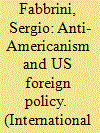

|
|
|
|
|
| Publication |
2010.
|
| Summary/Abstract |
From the end of the Cold War in 1991 to the end of the 2000s, anti-Americanism has passed through different phases in Europe, as well as in other parts of the world: it was modest in the 1990s, it exploded between 2003-2008, then declined after 2008. Although anti-Americanism continues to be rooted in many political cultures and experiences, its emergence in the post Cold War era seemed to be correlated to a United States foreign policy-making process unrestrained by either domestic or international institutions. When domestic and international multilateral checks have been unable to keep under control the exercise of US international power, then anti-Americanism has functioned as a sort of last resort critic on the latter. Anti-Americanism has seemed to be the reaction, more than to controversial foreign policy's decisions, to their unchecked elaboration and unilateral implementation. For world public opinion, the legitimacy of the foreign policy-making process counts more than the latter's outcomes.
|
|
|
|
|
|
|
|
|
|
|
|
|
|
|
|
| 11 |
ID:
184873
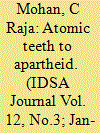

|
|
|
| 12 |
ID:
132083
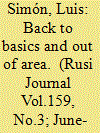

|
|
|
|
|
| Publication |
2014.
|
| Summary/Abstract |
As Allied combat forces return from Afghanistan, Russia's annexation of Crimea has reminded NATO that the security of a rules-based international system in Europe cannot be taken for granted. Efforts to reassure Allies and partners in Eastern Europe have thus become a top priority. This, however, should not lead the Allies to turn their backs on broader, global geostrategic developments - particularly at a time when Asia is emerging as the world's economic and geopolitical centre of gravity. If the West is to prosper in a changing world, argues Luis Simón, it should be able to both defend Europe and project security globally.
|
|
|
|
|
|
|
|
|
|
|
|
|
|
|
|
| 13 |
ID:
126676
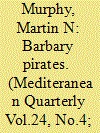

|
|
|
|
|
| Publication |
2013.
|
| Summary/Abstract |
This essay describes the piracy that took place in the Mediterranean from the time of ancient Greece to Barbary. It explains the corso, the sea war between nonstate but state-endorsed Christian and Muslim parties, with reference to the Knights of Malta and, more extensively, the Barbary corsairs. Although the essay focuses primarily on history, it also draws some conclusions about piracy and the international system today. The essay notes a prevailing assumption that contemporary piracy off Somalia and that perpetrated by the Barbary pirates is similar, but it further notes that any similarities are slight and superficial. At the same time, similarities rooted in economic, social, and political change do exist between all outbreaks of depredation at sea and the responses to them.
|
|
|
|
|
|
|
|
|
|
|
|
|
|
|
|
| 14 |
ID:
131995


|
|
|
|
|
| Publication |
2014.
|
| Summary/Abstract |
Within the scholarly debate on the current power transition in the international system, particular importance is attached to China's economic rise and the global shifts it is bringing forth in material primacy. A thorough understanding of these shifts in the relative distribution of power, however, requires leaving the narrow path of material capabilities and looking at normative accounts as well. Taking up this challenge, the article focuses on the political dimension of China's rise by exploring the country's alignment with South American governments along two dimensions: the convergence of their foreign policy ideas and the provision of diplomatic links facilitating their cooperation and coordination in global politics. The empirical analysis depicts a nascent global agenda forming between China and certain South American countries and shows that, along with growing levels of foreign policy compatibility, China has also advanced its diplomatic inroads into the region, particularly at the level of bilateral relations. Taking these developments as a whole, it is suggested that China has gained international attraction in terms of its visions of global order and as a potential political partner throughout the region. The article concludes with a discussion of the findings in light of the ongoing relative shifts in the distribution of global power beyond material primacy, and the prospects for China's further political rise.
|
|
|
|
|
|
|
|
|
|
|
|
|
|
|
|
| 15 |
ID:
150567
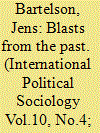

|
|
|
|
|
| Summary/Abstract |
This article is a brief inquiry into the changing meaning of war in Western political thought, with special reference to its role in fracturing the contemporary international system. I argue that contemporary debates about the changing nature of war have failed to note what I take to be the most important change in our understanding of war in recent decades—the return of the long-suppressed view that regards war as a productive force in human affairs. I substantiate this argument by showing how war was long believed to be productive of sociopolitical order in general, and of the modern state and the international system in particular. I then proceed to show how similar conceptions of war inform contemporary practices of military intervention and nation-building, and how the acceptance of this view among scholars has made them complicit in its legitimization and reproduction.
|
|
|
|
|
|
|
|
|
|
|
|
|
|
|
|
| 16 |
ID:
139223
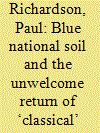

|
|
|
|
|
| Summary/Abstract |
This paper discusses how geopolitical visions from an earlier century are being reanimated in certain quarters of the political, intellectual, and military elite in the United States in order to frame recent shifts in China's status in the international system. However, these deterministic geopolitical lenses – like the historical antecedents they draw on – are misconceived and counter-productive, missing the sophistication and fluidity of world politics. It is suggested here that such reductionist geopolitical categories instead work to narrow the space for mutual understanding and deny the multiple versions of power and sovereignty in the world today.
|
|
|
|
|
|
|
|
|
|
|
|
|
|
|
|
| 17 |
ID:
117645
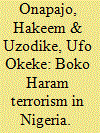

|
|
|
|
|
| Publication |
2012.
|
| Summary/Abstract |
Since the July 2009 Boko Haram terrorist outburst in Nigeria, there have been increasing questions on the phenomenon in the country. There has not been any substantial analysis on the emergence of the Boko Haram group and its terrorist activities in Nigeria as the out-rage continues. This study is advanced to explain the phenomenon of Boko Haram terrorism in Nigeria. It employs the levels of analysis framework popular in the field of international relations to explain the terrorism at three major levels: individual, state and international. The study relies on dependable news reports, which include interviews with key actors relevant to the subject matter, and finds that Boko Haram terrorism has its roots in the ideology and motivations of its founder and members, the failures and deficiencies of the Nigerian state, and the modern trend of religious terrorism in the international system.
|
|
|
|
|
|
|
|
|
|
|
|
|
|
|
|
| 18 |
ID:
120536
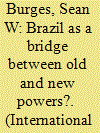

|
|
|
|
|
| Publication |
2013.
|
| Summary/Abstract |
Brazilian foreign policy demonstrates an interesting double aspect in the changing global system. Its rhetoric and overt positioning is framed around the idea of Brazil as a value-creating actor, while in reality there are significant value-claiming characteristics at the core of its approach to regional and global affairs.
The key for Brazil is its position as a 'bridge' between the South and the North, which allows its diplomats to establish the country as a critical coalition organizer and ideational leader for southern actors looking for major changes in global governance systems, and a central interlocutor for northern actors trying to cope with pressure from the South. Brazil's ambitions are simple: focusing more on an improved relative position, rather than a complete reformulation of the international system, which serves it well in economic, political and security terms.
To explain this argument the article focuses on Brazilian engagement with Africa and South America, as well as the country's approach to major negotiations such as the WTO's Doha round, the Free Trade Area of the Americas and the evolution of regional governance mechanisms such as the Organization of American States and the recently created Community of Latin American and Caribbean States. The pattern that emerges is one of Brazil working to create a consensus around its position, using its consequent leadership to improve Brazilian leverage in the regional and global arena.
|
|
|
|
|
|
|
|
|
|
|
|
|
|
|
|
| 19 |
ID:
125265
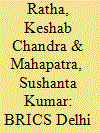

|
|
|
|
|
| Publication |
2013.
|
| Summary/Abstract |
BRICS (Brazil, Russia, India, China and South Africa) has developed into a vibrant co-operation mechanism. The New Delhi declaration of fourth BRICS summit reflects the evolution of a common vision and maturing relationship among member states in the current international system. The co-operation among BRICS nations is a reflection on the development of international situation as well as the desire and choice of emerging economies. The establishment of BRICS Development Bank is a crucial announcement for serving the development needs and aspirations of the emerging and developing world.
|
|
|
|
|
|
|
|
|
|
|
|
|
|
|
|
| 20 |
ID:
170689
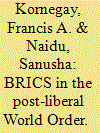

|
|
|
|
|
| Summary/Abstract |
Given complexities currently underpinning multipolar realities of the international system, it seems that a pluralist internationalism is becoming a strategic consideration for a post-Western world order. This warrants new agendas for cooperation. Based on the latter this analysis examines to what extent the BRICS can articulate such a new agenda based on a South African-informed perspective. This involves exploring the basis of a BRICS-African agenda competing with the geo-political interests of sub-groupings such as the SCO, RIC, and the EAEU. There seems ample room for BRICS, and South Africa as a member of BRICS, to make a difference in addressing how a changing African landscape through Agenda 2063 and implementation of the African Continental Free Trade Agreement can advance continental integration and its positioning globally. The onus is on South Africa to ensure that the African agenda in the BRICS finds resonance.
|
|
|
|
|
|
|
|
|
|
|
|
|
|
|
|
|
|
|
|
|